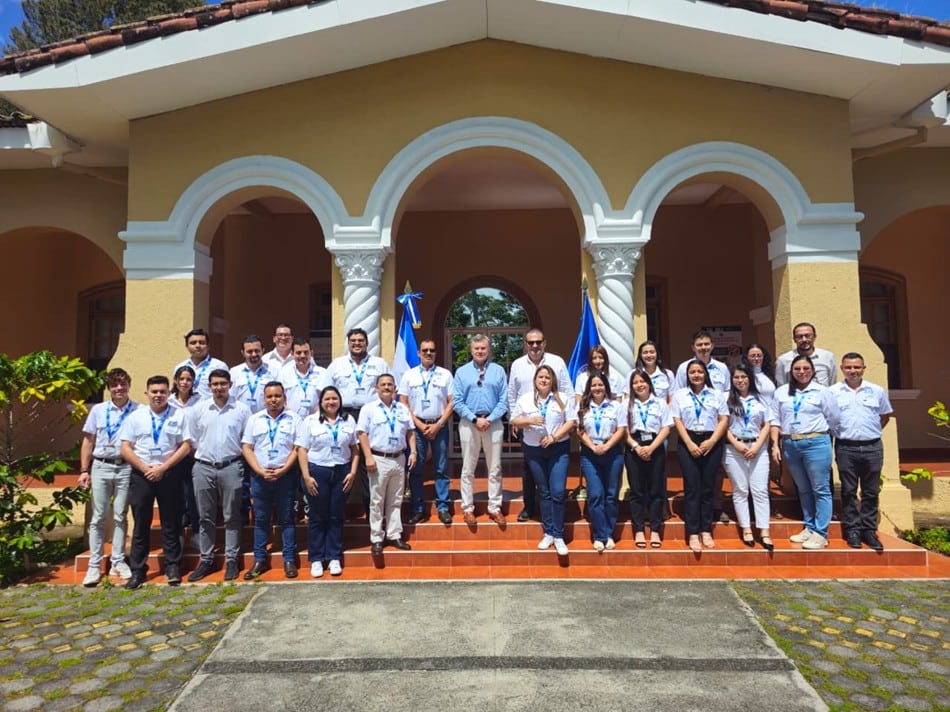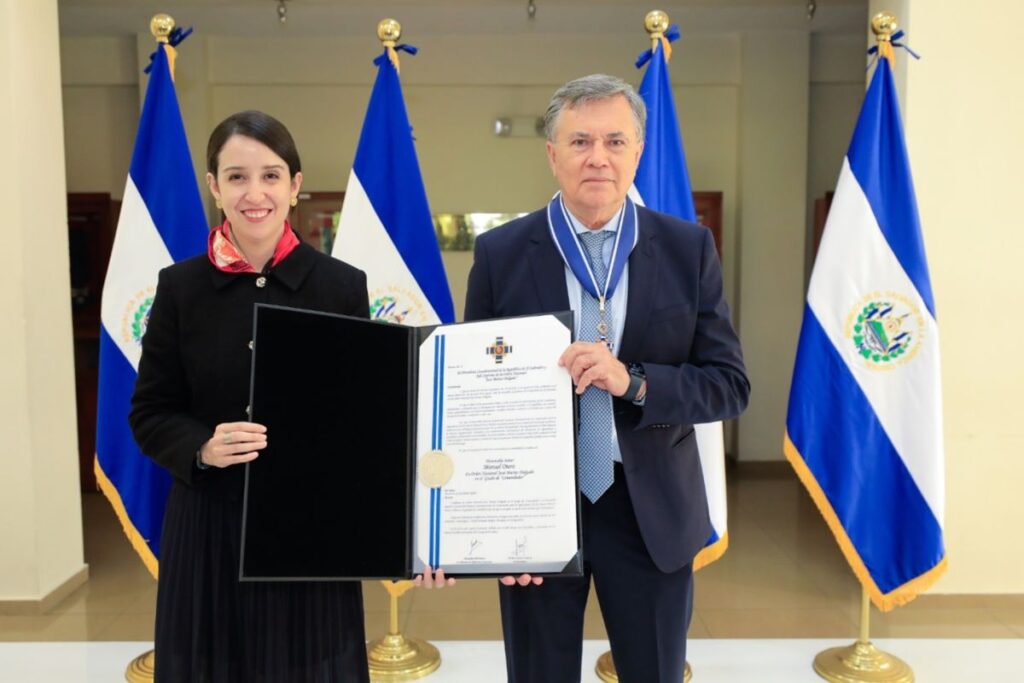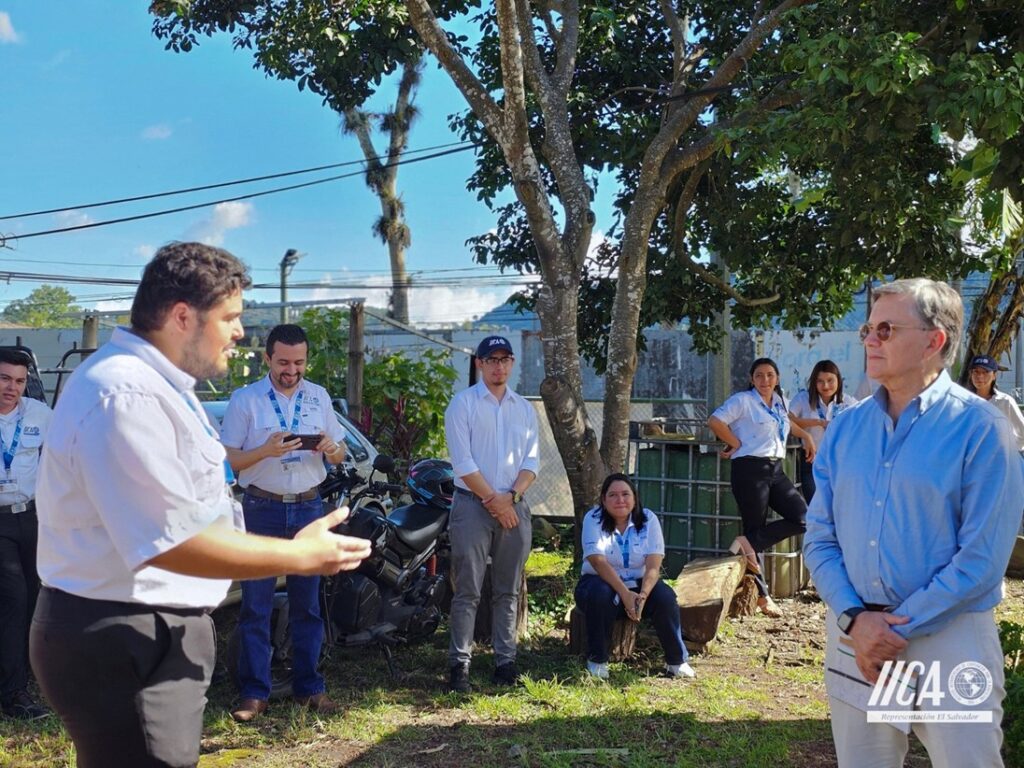
San José, 28 October 2025 (IICA). The Director General of the Inter-American Institute for Cooperation on Agriculture (IICA), Manuel Otero, was shown around the spaces dedicated to agricultural innovation and sustainability that operate at the hemispheric organization’s Delegation in El Salvador,during a working visit to the Central American country where he was also honored by the Ministry of Foreign Affairs for his contributions to food security across the Americas.
The Director General’s presence reflected IICA’s commitment to continue supporting El Salvador’s efforts to make its agriculture sector more resilient, innovative and sustainable every day, thereby contributing to the wellbeing of rural families and the country’s economic development.
Otero learned about the ongoing initiatives through which IICA ispromoting rural development and the resilience of the agriculture sector in El Salvador. It is one of the countries in the region that forms part of the Central American Dry Corridor, where the scarcity of water and other natural resources make productive activities difficult, especially for family farmers.
As part of the “IICA Open House” event, the Director General visited the ecological parking lot at the Delegation, which uses solar panels and a rainwater harvesting system to reduce energy consumption and optimize the use of water resources; and the Fruit Garden, which promotes biodiversity and healthy eating through the cultivation of crops such as nance fruit, avocados, cacao, and coffee.
He also visited the greenhouse, which houses a laboratory for testing and validating innovations in sustainable agriculture. It integrates technologies such as aquaponics, hydroponics, vertical farming, solar energy, climate sensors and ozone generators, designed to optimize production and efficient resource management.
Finally, he visited the IICA Kitchen Garden, designed with practices adapted to the Central American Dry Corridor, where crops such as corn, beans, cassava, squash and various vegetables are grown. He was also shown the Fab Lab, a digital fabrication laboratory equipped with 3D printers and drones that promotes technological innovation through the design of prototypes and works with the academic sector to develop solutions applied to agriculture.

Otero highlighted the creativity, dedication and technical expertise of the IICA team in El Salvador,and reiterated IICA’s commitment to continue promoting agricultural transformation in the country and throughout Central America, in support of social and economic development.
The Director General also took part in the presentation of IICA/El Salvador’s accountability report for 2023-2024, which focused on the main areas in which the Institute helped strengthen the country’s agriculture sector.
IICA’s Representative in El Salvador, Erick Quirós, stressed the importance of IICA’s joint work with the various strategic partners represented at the meeting, such as the U.S. Department of Agriculture (USDA), the Central American Agricultural Council (SE-CAC), the Development Bank of El Salvador (BANDESAL), the Tropical Agriculture Research and Higher Education Center (CATIE), the Directorate of Agroindustrial Trade Intelligence (DICA), the Enrique Álvarez Córdova National Center for Agricultural and Forestry Technology (CENTA) and the Argentine Embassy in El Salvador, reaffirming the ties of technical cooperation and collaboration.
Director General honored
During a ceremony held at the Ministry of Foreign Affairs, Otero received the honor of Commander of the National Order of José Matías Delgado fromDeputy Minister Adriana Mira, in recognition of his outstanding professional achievements and valuable contributions to agricultural development in the Americas, as well as his firm commitment to strengthening cooperation between IICA and El Salvador.
Membership of the National Order of José Matías Delgado is a distinction that El Salvador confers on heads of state of friendly nations and Salvadoran citizens and foreigners who have renderedoutstanding service to the country, and are recognized for their extraordinary civic, humanitarian, scientific, literary or artistic contributions.
The participants in the ceremony included senior government officials, representatives of the agriculture sector, members of the diplomatic corps and staff from the IICA Delegation in El Salvador.
Mira observed that Otero’s leadership had promoted science, technology and innovation in the agriculture sector at the hemispheric, regional and national levels, strengthening the ties of cooperation between El Salvador and IICA.

More information:
Institutional Communication Division.
comunicacion.institucional@iica.int











